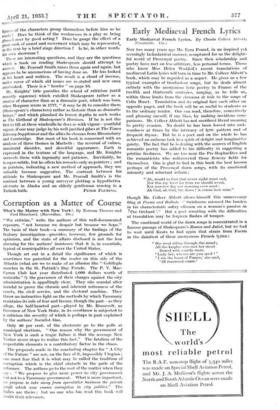Corruption as a Matter of Course
What's the Matter with New York?. By Norman Thomas and Paul Blanchard. (Macmillan. 10s.)
" WE criticize," write the authors of this well-documented exposure, " not because we despair but because we hope." The basis of their book—a summary of the findings of the Seabury investigation—provides, however, few grounds for optimism, and the state of affairs disclosed is not the less alarming for the authors' insistence that it is, in essentials, typical of municipalities all over the United States.
Though set out in a detail the significance of which is sometimes too parochial for the reader on this side of the Atlantic (what are we to make of an allusion like " Goldfogle marches in the St. Patrick's Day Parade. The P. V. Mac- Carren Club last year distributed 2,000 dollars worth of matzoths" ?) the gravamen of their charges against the city administration is appallingly clear. They cite scandal after scandal to prove the chronic and inherent rottenness of the courts, the civil service, and the electoral machine. They throw an instructive light on the methods by which Tammany maintains its rule of fear and favour, though the part—as they allege, the half-hearted part—played by Mr. Roosevelt, as Governor of New York State, in its overthrow is subjected to a criticism the severity of which is perhaps in part explained by the authors' Socialist bias.
Only 40 per cent. of the electorate go to the polls at municipal elections. " One reason why the government of New York is such a tragic failure is that the average New Yorker never stops to realize this fact." The fatalism of the respectable elements is a contributory factor in the chaos.
The proposals made in the concluding chapter for " A City of the Future " are not, on the face of it, impossibly Utopian ; one must fear that it is what may be called the tradition of corruption which is the chief obstacle in the path of the reformer. The authors go to the root of the matter when they say ; " We propose to give more power to city government but not to a Tammany government. What is more important, we propose to take away from speculative business the private profit which now causes corruption in city politics." The italics are theirs ; but no -one who has read this book will doubt their relevance.






































 Previous page
Previous page